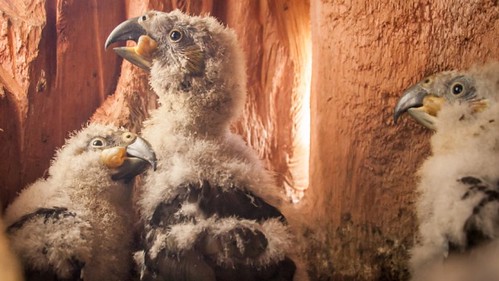 Kaka Brothers Bling and Casey. Image by Catherine BrimecombePerhaps there's something in the water. Or the trees.
Kaka Brothers Bling and Casey. Image by Catherine BrimecombePerhaps there's something in the water. Or the trees.
Virile kaka brothers Bling and Casey, who live in separate parts of Southland, are set to have their wings full for the next two months, having both fathered triplets this season.
DOC biodiversity ranger Catherine Brimecombe said Bling and his female partner, Charlie Brown, who live at the Te Anau Wildlife centre, had their triplets just before Christmas.
Bling's chicks would remain in the nest until at least February, she said.
So far the feathered father had done a good job looking after his family, she said.
 Two weeks ago kaka breeding pair Hannah and Casey hatched three young chicks at the Bush Haven Sanctuary near Invercargill. Image by Dave Nicoll"It's important to have a good male feed her on the nest."
Two weeks ago kaka breeding pair Hannah and Casey hatched three young chicks at the Bush Haven Sanctuary near Invercargill. Image by Dave Nicoll"It's important to have a good male feed her on the nest."
It was Bling's job to feed his partner once the chicks arrived, so she could feed the chicks.
When they were a little older the chicks may head to the Orokonui Eco-sanctuary, where Bling and Casey originally came from, or to Project Janzoon in the Abel Tasman National Park, Brimecombe said.
"Having the chicks released back into the wild is a lovely thought."
The chicks would likely undergo a soft release, which would see them living in an aviary to get them comfortable in the area, with the aviary opened allowing them to come and go as they pleased, she said.
Casey had been living at the wildlife centre with his brother but was sent by DOC to Invercargill when Otatara bird sanctuary Bush Haven put out the call for a male to help them create a breeding pair.
This gave Bling and Charlie Brown a chance to have a relationship, Brimecombe said.
Casey and his partner, Hannah, who live at Bush Haven had already bred successfully, hatching one egg in October last year.
Bush Haven operators May and Russell Evans said their kaka triplets hatched about two weeks ago.
When Casey arrived at their sanctuary he took advantage as soon as he was on the scene and did the business, May said.
"They're really good parents. We're quite thrilled with them."
DOC wanted the chicks from Bush Haven to go to the Orokonui Eco-sanctuary, Evans said.
